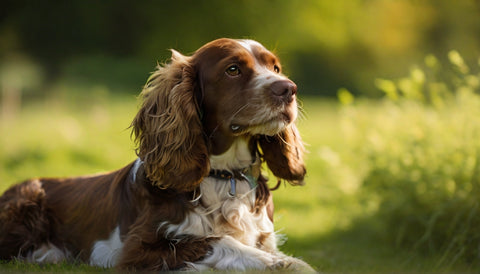Can Dogs Eat Cheese? Essential guide about cheese for dogs

Key takeaways:
-
Dogs can eat cheese in moderation; it’s a good source of protein, calcium, and healthy fats but should only be a treat and not a staple of their diet.
-
Not all cheese is safe for dogs. High-fat, high-sodium, and flavored cheeses like blue cheese or those with spices should be avoided.
-
Safe cheeses include cottage cheese, mozzarella, cheddar, and yak cheese (including yak cheese puffs with natural ingredients).
-
Cheese can aid training and enrichment when used in moderation—like frozen treats, pill pockets, or in puzzle feeders.
-
Portion control matters; size-specific cheese quantity guidelines help prevent overfeeding and digestive issues in dogs.
If you’re like most dog parents, you’ve probably caught your furry friend giving you those irresistible puppy eyes when you’re snacking on something. It’s hard to say no, right?
It's natural to wonder if your dog can enjoy the same foods as you. One popular question is, "Can dogs eat cheese?". Well, the short answer is yes, but there’s a bit more to it.
Let’s dive into everything you need to know about feeding cheese to your dog so you can keep them happy and healthy!
Cheese & Dog Health: Key Numbers
-
🔢 80–90% of adult dogs are lactose intolerant to some degree (source: Wag Walking)
- 🧀 Cheese should make up less than 10% of your dog’s total calorie intake.
Can Dogs Eat Cheese?
Absolutely! Dogs can eat cheese, and many of them love it. Cheese is packed with protein, calcium, and healthy fats that are great for your dog. It's also a good source of vitamins A and B12. It is also used as a training treat for dogs.
Is Cheese Bad for Dogs?
Cheese isn’t bad for dogs in general, but too much of a good thing can lead to problems. Some cheeses are high in fat, and giving your dog too much can result in weight gain or upset stomachs.
And if your dog is lactose intolerant, cheese could lead to allergy and health issues like gas, diarrhea, or even vomiting. Watch out for those high-sodium, super-processed cheeses, too. They’re not great for dogs—or humans, for that matter!
Is Cheese Good for Dogs?
Cheese can be good for your dog, but moderation is key. It is a good source of protein, calcium, and healthy fats that support your dog’s health. But, like all treats, it should only be a small part of their diet. Let’s look at some of the best cheese options you can give your dog.

Best Safe and Healthy Cheese for Dogs
Cottage Cheese

If you’ve ever wondered, can dogs eat cottage cheese? The answer is yes! Cottage cheese is a fantastic option because it’s low in lactose and high in protein. Plus, it’s gentle on their tummy, making it a great choice for dogs that can’t handle regular ones.
Mozzarella Cheese
Can dogs eat mozzarella cheese? You bet! Mozzarella is lower in fat than many other cheeses and contains less lactose, making it a safer option. It’s a tasty, occasional treat that your dog will love.
Cheddar Cheese
Cheddar cheese contains beneficial nutrients such as protein and calcium. While it contains higher fat compared to cottage or mozzarella cheese, it contains less sodium and can be given to dogs in small quantities.
Yak Cheese
Yak cheese, often found in the form of hard chews, is another excellent option for dogs. The chews are usually long-lasting and made from natural ingredients. They provide both mental stimulation and essential nutrients, like protein and calcium.
What Cheeses Should Dogs Never Eat?
Blue Cheese

It’s not toxic, but its strong flavor and moldy culture can upset your dog’s stomach. Better to play it safe and skip the blue cheese!
Feta Cheese
Feta is high in sodium, and too much could lead to serious health issues like dehydration or even kidney problems. A tiny amount might be fine, but why risk it?
String Cheese
We love it as a snack, but string cheese is processed and loaded with sodium. Your dog’s digestive system won’t thank you for it.
Cheese with Herbs/Spices
Cheese with added herbs, spices, or other seasonings can be harmful to dogs, as some ingredients like garlic and onion can be toxic (source). It is best to avoid such cheese and choose plain and simple cheese for your dog.
Best Ways to Give Cheese to Dogs
Dogs can enjoy cheese safely when it's used creatively and sparingly. Here are some safe, practical ideas for offering cheese:
-
🎯 Training Reward: Use pea-sized cheddar cubes during commands like "come" or "stay."
-
💊 Medication Concealer: Hide pills inside soft cheese (but not antibiotics).
-
🧸 Mental Enrichment: Smear soft cheese inside a Kong or puzzle feeder.
-
🧊 Frozen Treat: Freeze mozzarella bits in an ice cube tray for a summer snack.
Cheese can be an effective motivator in training—especially for dogs that ignore boring biscuits.
Can Dogs Eat Yak Cheese Puffs?
Yak cheese puffs, like other forms of yak cheese, are generally safe for dogs to eat. However, it's essential to check the ingredients list. Ensure there are no added spices, seasonings, or other harmful ingredients in cheese puffs.
Tibetan Cheese Puffs is a great example of cheese puff that contains all-natural ingredients and no added preservatives. They are high in protein and contain only a small amount of sodium.
Safety Guidelines for Feeding Cheese to Your Dog
If you decide to feed your dog cheese, follow these guidelines for the safety of your dog:
- Never give cheese to overweight dogs, dogs with kidney problems, or dairy-intolerant dogs.
- Avoid high-fat and high-sodium cheese. Prefer plain, unflavored cheese to feed your dog.
- As cheese is considered a treat, they should not consume more than 10% of total calorie consumption.
- Observe your dog after feeding cheese. If they show any signs of allergy or discomfort, consult a vet.
- Use cheese occasionally and incorporate it into meals to avoid excess calorie intake.
What happens when a dog eats cheese every day?
Feeding your dog cheese daily isn't necessarily harmful in small amounts, but moderation is key. Regularly consuming too much cheese, especially high-fat varieties, can lead to weight gain and potential digestive issues.
If you notice any signs of lactose intolerance, like gas or diarrhea, it might be wise to cut back and consult your vet.
✅ Tip: Use cheese no more than 2–3 times a week for treats or pill pockets.
Is mac and cheese good for dogs?
Mac and cheese is best avoided for dogs. While plain ones can be okay, mac and cheese often contains ingredients that aren't ideal for your dog, such as butter, milk, and processed cheese, which can be high in fat and salt.
The pasta in mac and cheese is also a source of carbs, which are not necessary for dogs and can contribute to weight gain.
What kind of cheese is safe for dogs?
Certain cheeses are safer for dogs than others. Low-fat cheeses like mozzarella and cottage are generally good options because they have less fat and sodium.
Always offer cheese in moderation and watch your dog for any adverse reactions, especially if introducing a new variety. Remember, each dog is unique, so what works for one might not work for another.
General Cheese Portion for Each Size Dog:
Here are the suggested general cheese portion sizes for dogs of different sizes. Remember that this is a general guideline and it may change according to the type of cheese you are using.
Extra-small (2-15 pounds) Dogs

- Examples: Japanese Chin, Yorkshire Terrier, Maltese, Affenpinscher , Papillon, Havanese, Brussels Griffon, Miniature Pinscher.
- How much to feed: A small piece of cheese roughly the size of a pea (about 1-2 grams).
Small (15-30 pounds) Dogs

- Examples: French Bulldog, Pug, Beagle, Boston Terrier, Basenji, Shiba Inu, Jack Russell Terrier.
- How much to feed: A piece of cheese around the size of a small marble (about 3-5 grams).
Medium (30-50 pounds) Dogs

- Examples: Border Collie, Cocker Spaniel, Brittany, Miniature Bull Terrier, Portuguese Water Dog, Vizsla
- How much to feed: A piece of cheese the size of a cherry (about 5-10 grams).
Large (51-70 pounds) Dogs

- Examples: Labrador Retriever, Golden Retriever, Border Collie, Chesapeake Bay Retriever, Dalmatian, Samoyed, Basset Hound, Boxer, Bulldog, Siberian Husky
- How much to feed: A piece of cheese approximately the size of a grape (about 10-15 grams).
Extra Large and Giant (71+ pounds) Dogs

- Examples: Great Dane, German Shepherd, Rottweiler, Doberman, Bullmastiff, Bernese Mountain Dog, Irish Wolfhound, Mastiff
- How much to feed: A piece of cheese roughly the size of a small plum (about 15-25 grams).
FAQs
▼ Can puppies eat cheese?
Yes, puppies can eat small amounts of cheese as an occasional treat. It's especially useful during training because of its strong smell and taste. Cheese also provides calcium, which supports healthy bone and teeth development. Just be sure to avoid giving too much, as puppies have sensitive stomachs.
▼ Can dogs eat cream cheese?
Dogs can have a small amount of **plain** cream cheese as a treat. Avoid any flavored cream cheese—especially those containing **onion, garlic, or chives**, which are toxic to dogs. Due to its high fat content, cream cheese should only be given rarely.
▼ Can dogs eat brie cheese?
Brie cheese is not toxic to dogs, but it's **very high in fat**, so it should only be fed occasionally and in tiny portions. If your dog is prone to pancreatitis or weight gain, it’s better to choose a low-fat cheese like cottage cheese or mozzarella.
Conclusion
Dogs can eat cheese in moderation, but it's essential to understand the potential risks as well. Remember to prioritize your dog's health and safety, and always consult with your veterinarian if you have any concerns. You can enjoy sharing cheese with your furry friend with the right knowledge and precautions.
References



2 comments
This guide is exactly what I was looking for! 🧀 I’ve always been curious about whether cheese is safe for my furry friend, and your post cleared up so much for me. Your breakdown of the dos and don’ts is super helpful—I feel more confident now! 🐶 I also found some fantastic details on Dogs Life Hacks about feta cheese that added even more clarity. Thank you for sharing such valuable info! ❤️
What an informative and engaging post! 🧀 I’ve been wondering about cheese for my dog, and this guide answered all my questions perfectly. Your advice is invaluable, and I also found some fantastic tips on DogsLifeHacks. Thanks for helping me keep my pup happy and healthy! I’m excited to visit your blog again for more great tips!